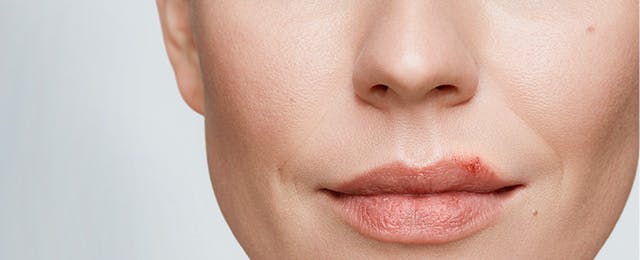What Causes a Cold Sore?
When we ask ‘what causes cold sores in the mouth and on the lips?’, we really should be asking 'what triggers cold sores?'. The herpes simplex virus (HSV-1) is the initial cause of the infection – without it there are no cold sores or blisters – but the blisters themselves are often triggered by psychological and environmental factors, such as stress or a cold i.
Triggers of cold sore outbreaks vary from person to person. What causes cold sores to appear for one person may not be the same for another. It's important to figure out your likeliest cold sore triggers so you can avoid them, or at least manage symptoms more quickly and effectively when they occur.
Cold Sore Triggers
The main causes of cold sores on lips are ii:
- stress
- fatigue
- exposure to sun and wind
- hormonal changes
- weakened immune system
Here Are Your Cold Sore Triggers:

Stress
Research has shown that feeling under pressure or being stressed can affect you physically. If you’re wondering if stress causes cold sores, the answer appears to be yes. When we’re under mental stress, our immune systems suffer. This gives your dormant cold sore virus a chance to replicate itself and cause havoc in the form of blisters.
Try these relaxation techniques:
- breath work
- mental body scan
- yoga
- meditation
- exercise
- get outside or spend time in nature

Fatigue
Fatigue is another possible answer when it comes to the question, what causes a cold sore outbreak? Feeling tired and run down can make you vulnerable to cold sores. Lower energy stores tax your immune system, making it harder for your body to deal with viruses, including the cold sore virus. Getting good quality rest is key to helping your body fight off the virus and prevent it from producing symptoms in the form of blisters.
There are plenty of things that can interfere with getting a good night’s rest – from stress to having too much caffeine. Here are some ways to help you get the quality sleep you need:
- Make your bedroom dark, quiet and comfortable.
- Avoid blue light from screens (TV/laptop/phone) after 8pm.
- Stick to a bedtime routine.
- Eat sleep-promoting foods such as veggies, beans and lean proteins.
- Nap for short periods of 10-30 minutes before 3pm only.
- Exercise earlier in the day.

Cold weather
Cold weather can trigger cold sores. Changes in temperature and air moisture can play havoc with your body’s ability to keep the virus from producing blisters. The dry air and colder temperatures of winter, as well as wind can cause your lips to dry out, making them more vulnerable to a blister outbreak.
Look after your lips and keep cold sores at bay with these methods:
- Protect your face against cold, wind and sun.
- Dress warmly.
- Stay indoors to avoid severe weather.
- Drink plenty of liquids to stay hydrated.

Excessive sunlight
Sun exposure, along with the common cold and fatigue, is one of the top three causes of cold sores.iii There are some easy ways to protect yourself:
- Wear a lip sunscreen or block.
- Use a wide-brim hat.
- Stay in the shade.

Hormonal changes
The rise and fall of hormones during a natural menstrual cycle can be a cause of cold sores, too. Cold sores are often experienced just before or during your period as a result of the hormonal changes. Some women also experience outbreaks during pregnancy.
In order to combat this, you can try the following tips:
- Pay attention to your menstrual cycle.
- Be prepared for pregnancy.
- Rest more.
- Try relaxation exercises.

Dental Treatment
Visiting a dentist may trigger an outbreak of cold sores. Pressure on the lips or mouth area during dental treatment can result in a cold sore blister, as can the stress and anxiety some people experience during dentist visits.
Minimize the chances of an outbreak with the following tips:
- Talk to your dentist about cold sores.
- Call your dentist in advance if you have a cold sore.
- Apply a cool compress to your lip after your visit.

Weakened immune system
The cold sore virus lives inactive in your mouth area in nerve cells. But while your immune system usually ensures that the virus doesn’t replicate and cause blisters, if it’s busy fighting off another virus or infection, such as a cold or the flu, you may experience a cold sore outbreak.
Here are some steps to help avoid an outbreak during cold and flu season:
- Be prepared before flu season begins (winter).
- Get a flu vaccination.
- Be germ conscious – wash your hands more often.
- Stop smoking.
- Eat foods that are rich in vitamins A, C, and E.
- Give your body time to rest and repair.

What Causes Cold Sores – Next Steps
Knowing more about the triggers of cold sore outbreaks is your first step towards avoiding them, and it can also help you be prepared to catch that tingling before it turns into a full-blown blister. Use Abreva® Cream as soon as you feel that telltale tingling or burning sensation and you’ll be able to recover sooner. The active ingredient in Abreva® Cream works by blocking the virus from entering healthy skin cellsiv.
Take this short quiz to see what triggers your cold sores
- i. What causes cold sores? WebMD. https://www.webmd.com/skin-problems-and-treatments/ understanding-cold-sores-basics#2. Accessed 11/06/2019. ↵
- ii. Cold sores. Mayo Clinic. https://www.mayoclinic.org/diseases-conditions/cold-sore/symptoms-causes/syc-20371017. Accessed 11/06/2019.↵
- iii. Sunlight is an important causative factor of recurrent herpes simplex. Cutis. https://www.ncbi.nlm.nih.gov/pubmed/15603217. Accessed 06/25/19. ↵
- iv. How Abreva cream works. Abreva. https://www.abreva.com/cold-sore-products/how-abreva-cream-works/. Accessed 11/06/2019. ↵
SOURCES
By clicking any of the links below you will be taken to an external website that is independently operated and not managed by Haleon. Haleon assumes no responsibility for the content on the website. If you do not wish to leave this website, do not click on the links below.





